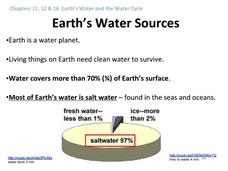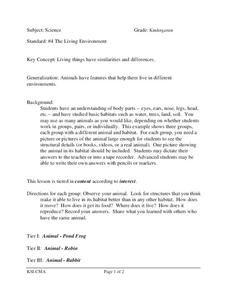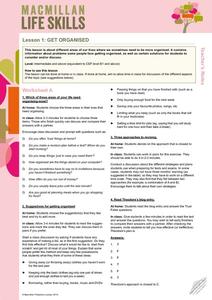California Academy of Science
Pollution in Our Watershed
The concept of a how pesticides and other chemicals pass through a watershed can be difficult for younger learners to grasp without a concrete example. In the activity here, some blank paper, markers, and a spray bottle are all you need...
American Museum of Natural History
What's This? Feeding
Some species have pretty creative methods for catching food. Young scientists learn about some interesting ways organisms get the nutrients they need by navigating an online interactive lesson that would be suitable for a remote learning...
K5 Learning
The Life Cycle
Studying plant, animal, or insect life cycles? Pair a science unit with a reading comprehension worksheet on life cycles. The passage touches briefly on butterfly, plant, frog, and dog life cycles before prompting readers to answer six...
National Park Service
Reduce Our Carbon Footprint, Let’s Compost!
Roll up your sleeves and get a little dirty with this elementary and middle school compost lesson. All you need is a large plastic container, a couple old newspapers, some organic waste, and a few hundred worms and you're ready to start...
Curated OER
Earth's Water Sources
General facts about Earth's water sources, human use, and the water cycle are outlined by this presentation. Slide three has a grammatical error and slide nine refers to the local watershed of the author, so you will need to make a few...
Curated OER
Gerund as Subject
Working in groups, learners practice using gerunds as subjects by talking to one another. Then, independently, they write sentences using a subject, a verb, and a subject complement from a given list of each and in their own words. They...
Curated OER
Tracing Our Own Family Pilgrimages
The Pilgrims may have arrived in North America by way of the Mayflower, but chances are, your class members' ancestors came to the United States in another way. Guide them through an exploration of their own heritage, countries of...
Curated OER
Earth's Water
If the majority of our planet is covered with water, why do we need to bother conserving it? With a thorough and varied investigation into the location and types of water on the earth, learners will gain an understanding of why this...
Curated OER
What is Biology?
In this human needs worksheet, students review a graphic organizer explaining the basic human needs. Then students complete 1 true or false and 2 short answer questions.
Curated OER
Forests Need People
For this forests and people lesson, 3rd graders brainstorm what forests are used for, discuss forest habitats, and how human interventions have affected trees and animals that depend on the forest environment. Students read the books,...
Curated OER
Urban Life: What Lives In Our Local Park?
Fifth graders participate in activities during a visit to Central Park. In this urban life lesson, 5th graders visit Central Park where they explore pond dipping, stream chemistry, and play a native plant Bingo game.
Curated OER
The Living Environment
Students investigate animals and their environments. In this animal similarities and differences lesson plan, students explore animal adaptations and features and their habitats. Students get into groups to discuss the habitat and how...
Curated OER
Do Plants Need Water?
First graders observe the effects of varying amounts of water, sun, and air on lima bean plants. They also predict and describe their outcomes in a written report.
Curated OER
Wanted: Water!
Students determine what percentage of the Earth is water and how much water is needed by humans.
Curated OER
Can You "Gas" What's Happening?
Students examine gas production in "soil" samples through hands on activities and class discussions, to determine if the soil samples have contain living or non-living systems.
Curated OER
Under The Sea
Second graders study how a tsunami is formed by underwater events such as earthquakes, volcanoes or landslides. They discuss what they knew about living and non-living things in the ocean.
Curated OER
Pond Ecology
Fifth graders examine pond ecology, testing how temperature affects the respiration rate of fish. They collect various living things found at a pond, and identify the animal and plant life discovered. They observe a pond community in an...
Curated OER
Genes and Inheritance
Young scholars explore genes and inheritance. After listening to a story describing a rare genetic disease, students discuss inheritance and how living things pass on traits to their children. In groups young scholars, students...
Virginia Department of Education
A Designed Organism
How can you encourage pupils to demonstrate creativity while still meeting the objective of applying technical knowledge? This activity is your answer! Scientists will create an imaginary creature and prepare a graphic organizer with...
Outdoor Learning Center
Outdoor Survival
Which of the following can you survive without for the longest time: water, food, or a positive mental attitude? The answer may surprise you. Guide learners of all ages through games, activities, and discussions about surviving in the...
Macmillan Education
Get Organised
The focus of the first lesson in a 23-lesson life skills unit is on getting organized. The worksheets ask users to identify areas of their lives were they need more organization and then offer suggestions and solutions.
K12 Reader
Abraham Lincoln Bio Poem
Everyone knows about Abraham Lincoln as a historical figure, but what was he like as a person? Young historians complete a biopoem about Lincoln, including his character traits, his relationships, his fears, and his needs.
American Museum of Natural History
If Trash Could Talk
Trash can talk! Young archaeologists dig through their trash to see what it reveals about their lives. After they examine their midden, links permit users to test their knowledge of archaeology with a 10-questions quiz, learn how...
Utah Education Network (UEN)
Values
Being self-aware of personal wants, needs, and values is a big part of growing up. Here, you'll find seven different teaching options and two different introductions to a lesson on getting learners to think about their personal values....

























